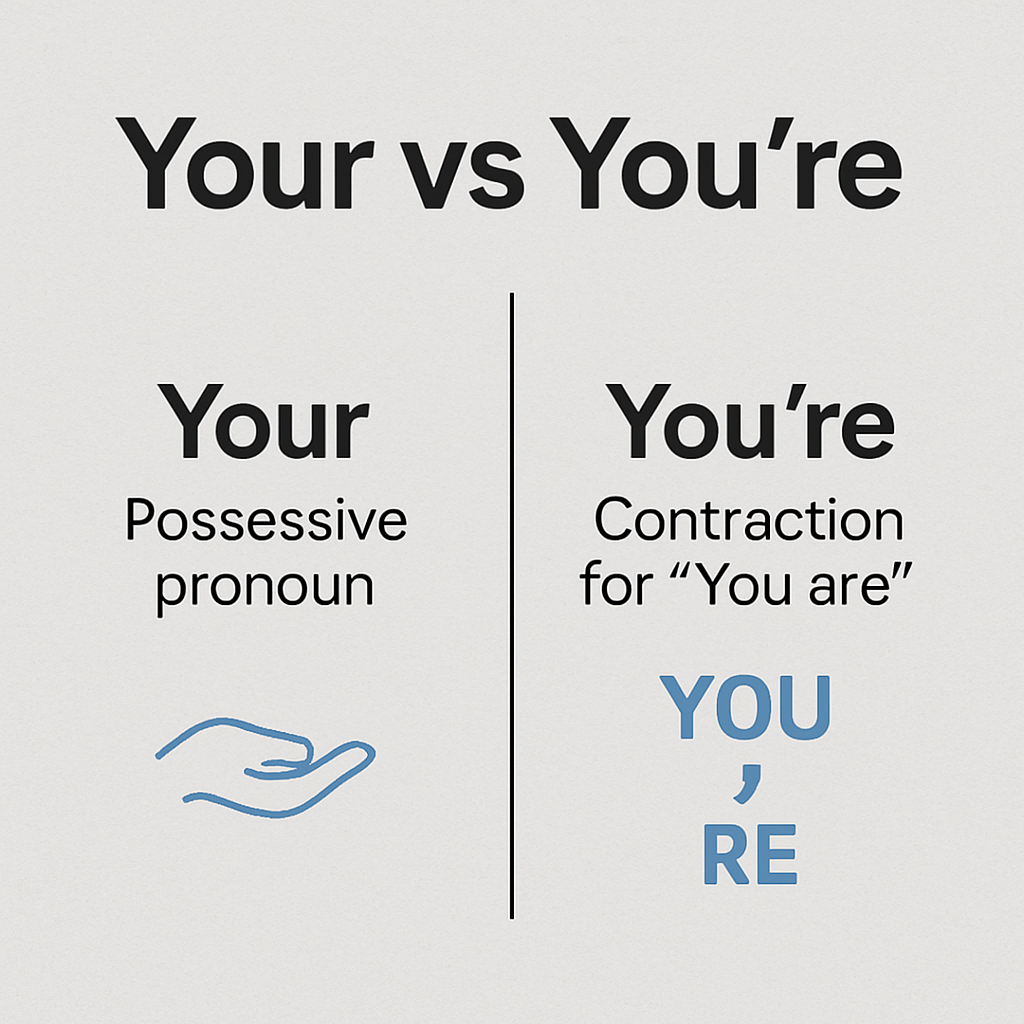Your vs You’re

Mixing up your vs you’re is one of the most common writing errors in English. Because these two words sound exactly the same, people often use them interchangeably without realizing their meanings are completely different.
“Your” is a possessive pronoun that shows ownership, while “you’re” is a contraction of “you are.” Understanding the difference matters, especially in professional or academic writing, where even small grammar mistakes can affect clarity and credibility.
In this article, you’ll learn the grammatical differences between your vs you’re, see common usage examples, and get simple tips to help you remember which is which. Mastering this pair will instantly improve your writing and communication.
Grammatical Explanation of Your vs You’re
Let’s break down the grammatical difference in your vs you’re:
- “Your” is a possessive pronoun. It shows that something belongs to the person being spoken to.
Example: Is this your phone?
Here, “your” shows that the phone belongs to “you.” - “You’re” is a contraction of “you are.”
Example: You’re very kind. (You are very kind)
The key difference between your vs you’re lies in usage: “Your” modifies a noun, while “you’re” functions as a subject and verb combination.
To test which one to use, try replacing the word with “you are.” If the sentence still makes sense, “you’re” is correct. If not, you should probably be using “your.”
Understanding this simple test will help you get your vs you’re right every time.
Real-Life Examples
Here are some examples of how to correctly use your vs you’re, along with common mistakes to avoid:
Correct usage of “Your” (possessive):
- Your bag is on the table.
- I like your writing style.
Incorrect usage of “Your”:
- Your welcome to join us.
Should be: You’re welcome to join us.
Correct usage of “You’re” (you are):
- You’re doing a great job.
- I think you’re right.
Incorrect usage of “You’re”:
- Is this you’re book?
Should be: Is this your book?
By practicing these examples, you’ll easily spot when to use your vs you’re in both casual and formal writing.
Common Mistakes
The most common mistake in your vs you’re is using “your” when you actually mean “you are.” This often happens in phrases like:
- Your amazing at this!
You’re amazing at this!
Another error is spelling “you’re” as “your” in greetings or responses:
- Your welcome.
You’re welcome.
This kind of mistake might go unnoticed in casual texts, but it can stand out in emails, resumes, and professional communication.
Always double-check whether you’re expressing ownership (your) or making a statement (you’re) to avoid embarrassing mix-ups.
Memory Tips
Use these simple tricks to remember the difference between your vs you’re:
- You’re = You are
Try replacing the word with “you are.” If the sentence still makes sense, use “you’re.”
Example: You’re my friend → You are my friend. - Your = Belonging to you
Think: “Is that your coat?” You wouldn’t say, “Is that you are coat?” - Visual tip:
“You’re” has an apostrophe because it’s two words joined together—“you” + “are.” - Quick test:
If you can’t say “you are” in the sentence, don’t use “you’re.”
These tricks will help you win the your vs you’re battle for good.
Conclusion
Understanding your vs you’re is simple once you know the difference: use “your” to show possession and “you’re” when you mean “you are.” These small choices can make a big impact on how professional and clear your writing appears.
Want more grammar tips? Check out our internal guide on It vs It’s to avoid another common mix-up.
Need an extra refresher? Read Grammarly’s breakdown of your vs you’re for more examples and clear explanations.